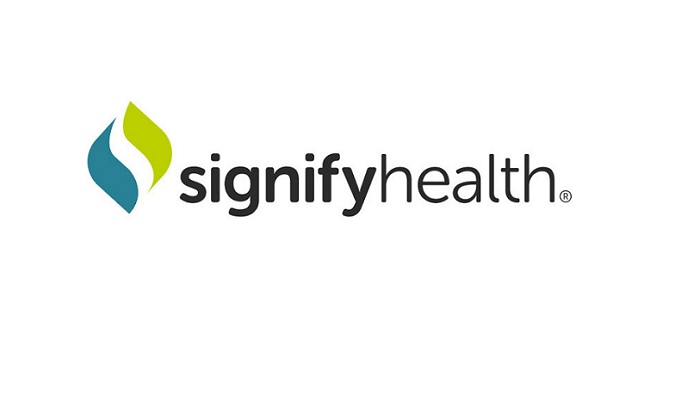Signify Health, Inc. a leading value-based care platform that leverages advanced analytics, technology and nationwide healthcare provider networks, has activated its Transition to Home solution in 50+ hospitals to provide Medicare patients with the clinical and social care support they need as they make the transition from the hospital to the home. The solution, designed to reduce the clinical and financial impacts of avoidable inpatient readmissions and unnecessary emergency department visits, is being used by some of the industry’s most visionary health systems and healthcare providers, including Ardent Health Services, Beaumont Health, Cape Fear Valley Health, and Premier Health.
Signify Health’s Transition to Home solution is designed to complement existing post-discharge care coordination strategies at hospitals, health systems, clinically-integrated networks (CINs), and accountable care organizations (ACOs). Through virtual and telephonic clinical and social care coordination, Signify Health employs an evidence-based, holistic clinical model that supports Medicare patients for 90 days following discharge from an acute care facility. Through this customizable and scalable model, Signify Health collaborates with patients and their care teams to improve quality of care and outcomes, and to ensure a high-touch patient experience that extends beyond the four walls of the facility.
“As large health systems and physician groups assume more risk, they are looking to better address those clinical and social gaps that exist outside the acute care setting, but that can have a significant impact on the health outcomes of their patients,” said Kyle Armbrester, Signify Health CEO. “We are delighted to activate our extensive capabilities of engaging patients in and around the home for our provider partners participating in episodes and other value-based programs. Facilitating a timely transition to the home and extending our partners’ reach beyond the hospital setting will enhance patient care experience, achieve better outcomes and improve financial performance.”
Potentially avoidable hospital readmissions cost Medicare approximately $17 billion per year with hundreds of thousands of patients affected. Post-discharge barriers to recovery are responsible for many of these readmissions and encompass a broad range of issues such as social determinant of health gaps, multiple comorbidities, medication mismanagement, and poor care plan adherence.
An analysis of readmission results for 800,000 episodes of care managed by Signify Health under Medicare’s value-based bundled payment program (BPCI-A) shows that nearly 44% of all readmissions occur more than 30 days following discharge from the hospital. To address the risk of readmission during this critical phase, Signify Health’s Transition to Home solution provides evidence-based clinical and social care coordination services to patients during the 90 days following discharge. The services offered include risk stratification, patient education, a social needs and behavioral health assessment, medication review, care plan reminders, PCP and specialist follow-up facilitation, coordination with acute care clinicians, and escalation and triage care pathways.
These services are performed by Signify Health’s interdisciplinary care team of clinical and social care coordinators, pharmacists, nurses and physicians, who maintain a regular cadence of contact with patients and providers to identify and address individual needs and act as an extension of the patient’s care team. Signify Health’s care team leverages proprietary technology and tools to coordinate care with the patient’s PCP, apply evidence-based care coordination interventions, and facilitate in-network utilization.
By applying motivational interviewing techniques that enable deeper conversations, Signify Health care coordinators typically identify between two and four social needs (such as food insecurity and lack of access to transportation) per patient and are able to address more than 50% of those needs.
“Signify Health’s evidence-based approach for our Transition to Home solution focuses on key drivers of unnecessary rehospitalizations,” said Marc Rothman, M.D., Chief Medical Officer, Signify Health. “Our clinical and social care professionals are trained to address patients’ needs regardless of their risk level, ensuring that provider care teams can focus on the highest-need cases. Ultimately, this offering was built to deliver on the most important metric of success: healthier, happier patients and empowered clinicians.”
Since launching the program on a pilot basis in 2021, Signify Health’s Transition to Home solution has grown rapidly and is now supporting patients in 10 states. Early results indicate strong consumer interest in telephonic post-discharge care coordination support, with upwards of 60% of patients reached engaging with the Signify Health care team and early analyses showing this engagement has a statistically significant effect on reducing rehospitalization rates.
To learn more about Signify Health’s Transition to Home solution, please visit our website at https://www.signifyhealth.com/solutions-episodes-of-care-transition-to-home or contact us at info@signifyhealth.com.
About Signify Health
Signify Health is a leading healthcare platform that leverages advanced analytics, technology, and nationwide healthcare provider networks to create and power value-based payment programs. Our mission is to transform how care is paid for and delivered so that people can enjoy more healthy, happy days at home. Our solutions support value-based payment programs by aligning financial incentives around outcomes, providing tools to health plans and healthcare organizations designed to assess and manage risk and identify actionable opportunities for improved patient outcomes, coordination and cost-savings. Through our platform, we coordinate what we believe is a holistic suite of clinical, social, and behavioral services to address an individual’s healthcare needs and prevent adverse events that drive excess cost, all while shifting services towards the home.


















